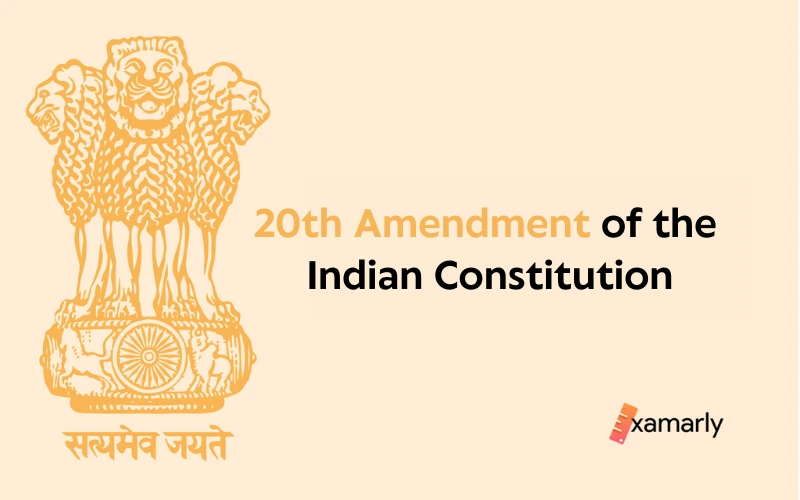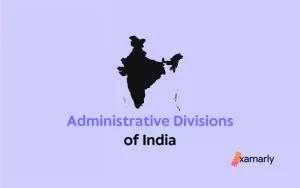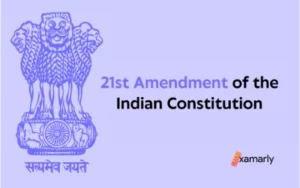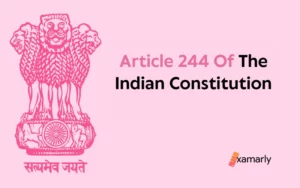The 20th Amendment of the Indian Constitution, also known as The Constitution (Twentieth Amendment) Act, 1966, inserted a new Article 233A, among other things such as validating the appointments, postings, promotions, and transfer of District judges.
This amendment establishes new jurisdictions that have the power to certify the appointments, promotions and transfers of District judges and judgments made before the enactment of current law in States that have not complied with the corresponding provisions of Article 233 of the Indian Constitution.
The bill for the amendment act, proposed by former Home Minister Y.B. Chavan, was intended to add a new Article to the Constitution.
Gain a complete understanding of the “20th Amendment of the Indian Constitution” through this blog to aid your UPSC preparation.
- 20th Amendment of the Indian Constitution: Explained
- Background
- Date enacted
- Important provisions
- Prominent people involved
- Conclusion
- FAQs related to the 20th Amendment of the Indian Constitution
- What is the official name of the 20th Amendment of the Indian Constitution?
- Who introduced the bill for the 20th Amendment Act of the Indian Constitution in Parliament?
- What was the bill called?
- When was the bill introduced in Parliament?
- When was the bill approved by the Rajya Sabha?
- When did the 20th Amendment of the Indian Constitution come into effect?
- Which new article was added to the Constitution of India through the 20th Amendment of the Indian Constitution?
20th Amendment of the Indian Constitution: Explained
The 20th Amendment Act of 1966 (also known as The Constitution (Twentieth Amendment) Act, 1966) added a new article 233A to the Constitution of India.
This provision upholds the secondment, promotion, transfer, appointment of district judges, and judgments rendered by them prior to the effective date of the current law.
Also Read: 19th Amendment of the Indian Constitution
Background
States like Uttar Pradesh, cannot adhere to the constitutional guidelines in choosing courts. Therefore, the Supreme Court ruled that the procedures set out in Article 233 must be followed.
The power of transfer of a District judge from one body to another is not included in the placement of District judges under Article 233. Instead, Article 235 of the Constitution gives the power of transfer to the High Court.
The legitimacy of the verdicts has already been called into question in numerous literary and other procedures, orders, and judgments rendered by these District judges. There are virtually no District courts in Uttar Pradesh.
Therefore, it was urgent to confirm the appointments, titles, promotions and transfers of each of these District judges. It excludes persons unfit for appointment under Article 233 and judgments, writ petitions, orders and judgments previously made or made in those States.
Date enacted
On November 25, 1966, the 20th Amendment, was debated in the Indian Parliament. It was proposed by former Home Minister, Y. B. Chavan and was intended to add a new Article 233A to the Constitution.
The short title “Twenty third” was changed to “Twentieth” and a new Article 233A was proposed. This was the only formal legislative change before it was reviewed and approved by the House of Representatives on December 3, 1966.
Rajya Sabha debated and approved the bill on December 9, 1966.
On December 22, 1966, the measure was approved by then-president Zakir Hussain and entered into force on the same date.
On December 23, 1966, the Indian Gazette published an announcement about it.
Important provisions
The 20th Amendment Act contains confirmation of validation of appointment and judgment of certain District judges, and similar other rules, as given below :
- A person who is already in the judicial service of a state or who has been an attorney or petitioner for at least 7 years cannot be appointed as a District judge in that State.
- Prior to the enactment of the 20th Amendment Act, posting, promotion, or transfer of persons as District judges were prohibited except in accordance with the provisions of Articles 233 or 235.
- No judgment, ruling, judgment or order was made or issued by or prior to the coming into force of the 20th Amendment Act by or before the appointee; or any other act or procedure may be performed or taken. If appointed, promoted, or transferred as a district judge under the provisions of Article 223 or Article 235, only on the fact that the appointment is illegal or void, or has become illegal or void. Promotions or assignments carried out in accordance with the rules mentioned shall not apply.
Prominent people involved
The former Home minister, Y.B. Chavan presented the bill for the 20th Amendment Act in Parliament. The bill was approved by then-President Zakir Hussain and put into effect on the same day.
You Might Also Like: 21st Amendment of the Indian Constitution
Conclusion
Through this blog for UPSC preparation, you got to learn that the Constitution (20th Amendment) Act, 1966, added a new Article 233A.
The amendment act is primarily concerned with the appointment, secondment, promotion, and transfer of district judges to the effective date of existing laws enacted in states, that do not comply with the provisions of Article 233 or Article 235 of the Constitution.
FAQs related to the 20th Amendment of the Indian Constitution
What is the official name of the 20th Amendment of the Indian Constitution?
The Constitution (Twentieth Amendment) Act, 1966.
Who introduced the bill for the 20th Amendment Act of the Indian Constitution in Parliament?
The then Home Minister, Yashwantrao Chavan.
What was the bill called?
The Constitution (Twenty-third Amendment) Bill, 1966.
When was the bill introduced in Parliament?
November 20th, 1966.
When was the bill approved by the Rajya Sabha?
December 9, 1966.
When did the 20th Amendment of the Indian Constitution come into effect?
December 22nd, 1966.
Which new article was added to the Constitution of India through the 20th Amendment of the Indian Constitution?
Article 233A of the Indian Constitution.






